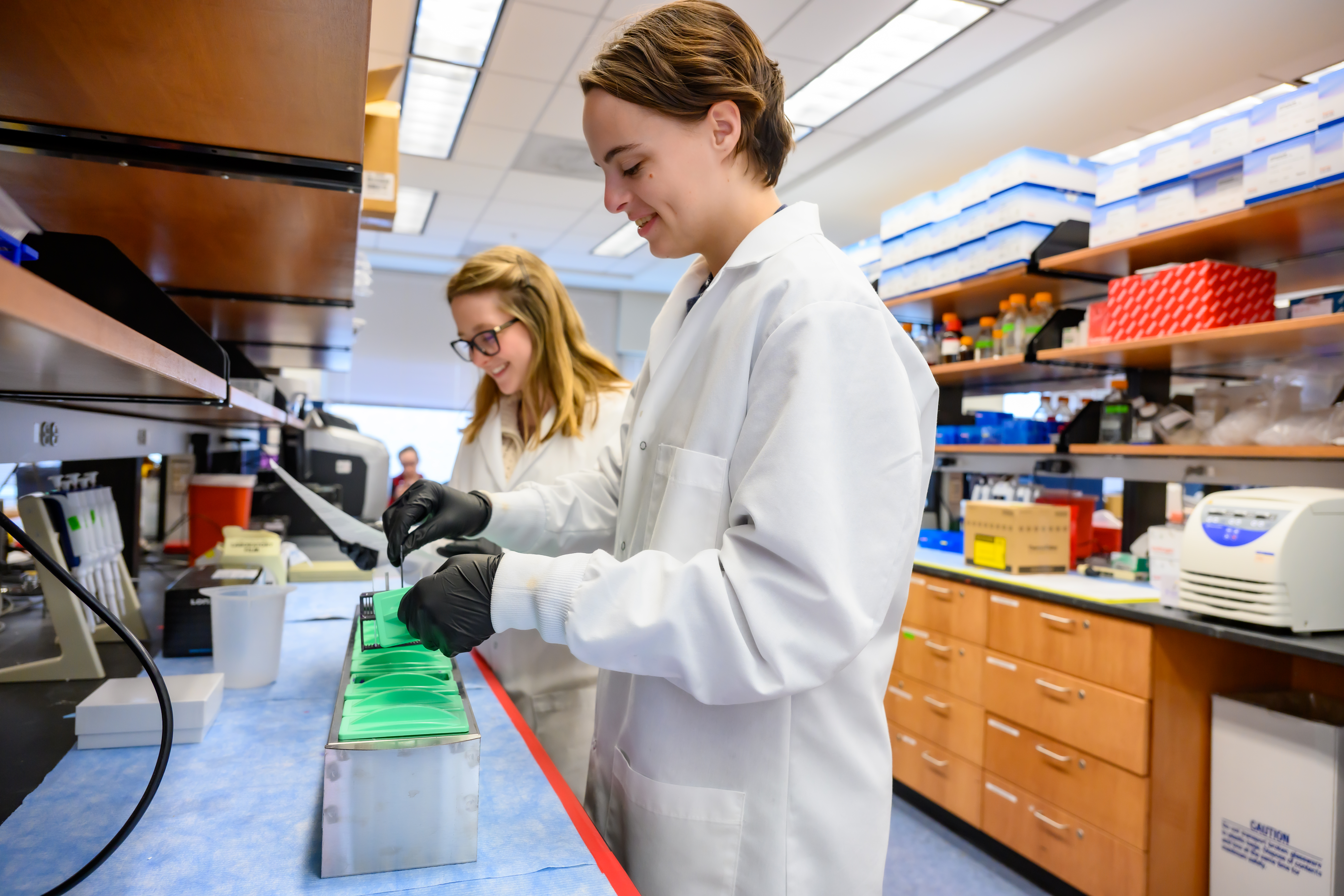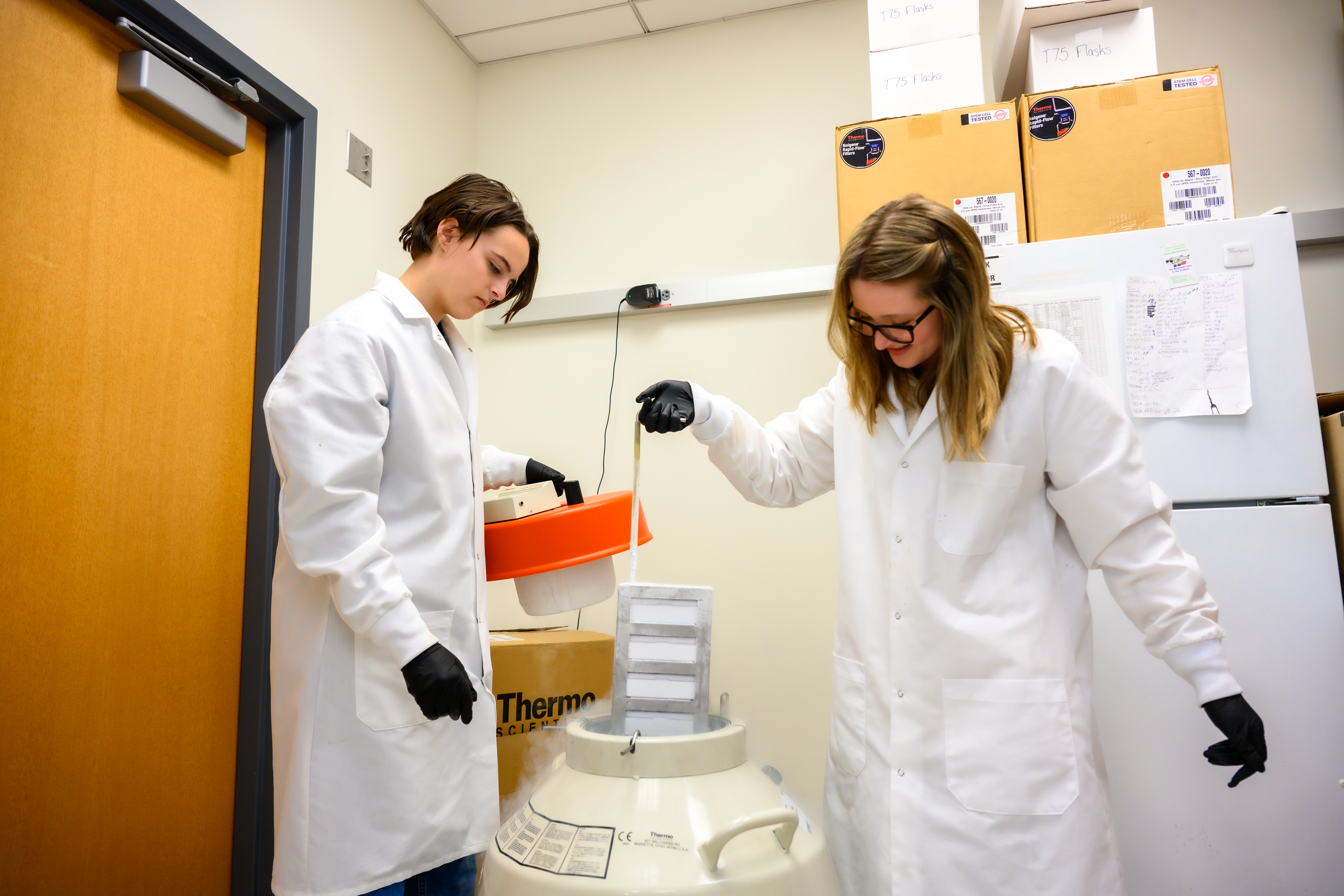
As Jayla Boyd and Lillian Floyd would describe it, they were in uncharted territory when they arrived on the West Virginia University campus for Brain Camp. By the end of the week, the soon-to-be high school seniors had discovered the complex world of neuroscience and were hooked.
“I had an interest in medicine from the start, but Brain Camp was my first taste of neuroscience,” Jayla said. “It gave me an opportunity to explore something I wasn't being taught in high school. I instantly fell in love.”
 One year later, Jayla and Lillian enrolled as freshman in the Eberly College of Arts and Sciences neuroscience program and joined the research lab led by Randy Nelson, chair of the School of Medicine Department of Neuroscience and Hazel Ruby McQuain Chair for Neurological Research.
One year later, Jayla and Lillian enrolled as freshman in the Eberly College of Arts and Sciences neuroscience program and joined the research lab led by Randy Nelson, chair of the School of Medicine Department of Neuroscience and Hazel Ruby McQuain Chair for Neurological Research.
The two students learned about Nelson’s research related to circadian rhythms during Brain Camp. The session sparked an interest for Jayla who worked with the Research Apprenticeship Program once she became a WVU student to be placed in his lab, and Lillian joined her after reaching out to Nelson about research opportunities.
Jayla is contributing to a study investigating optimal times for chemotherapy administration based on circadian rhythms and permeability of the blood-brain barrier, which keeps foreign substances from entering the brain and limits potentially effective medicines, immunotherapy, gene therapy and other therapeutics. Using the natural increase of permeability, which changes throughout the course of the day, may assist with delivering drugs into the brain more effectively.
Lillian’s research is focused on ghrelin, a hormone associated with hunger, and its impacts on tumor cell growth and breast cancer. The study is expanding on prior research by investigating additional genes associated with tumor growth and metastasis into the brain conducted by William Walker, a postdoctoral researcher in the lab.
“I believe strongly that allowing opportunities for undergraduates to learn about and participate in research is critical for their education,” Nelson said. “One of my favorite things about being on the WVU faculty is hosting undergraduate students to conduct meaningful research in our lab. Virtually every faculty member I know, including me, had the wonderful opportunity to participate in research as undergraduate students, an experience that shaped our understanding of how information and knowledge are generated and adjusted over time, and motivated many of us to pursue a career in science.”
 The opportunity to work in a research lab has allowed for the students’ classroom curriculum to be utilized in a real-world environment.
The opportunity to work in a research lab has allowed for the students’ classroom curriculum to be utilized in a real-world environment.
“Participating in research has allowed me to improve my classroom academics, and the classroom academics help me improve my research,” Jayla said. “It’s a back-and-forth relationship that has made me think and grow.”
Lillian echoed Jayla’s thoughts, adding that in-class lessons have added to the research experience and provided insights into a future career.
“It’s helpful that in class we’re learning the foundations for what we’re doing in the lab,” Lillian said. “We’re immediately applying all our knowledge, which makes it that much more well-rounded.
“It has given me a step ahead in seeing what research as a career is like, what people do in their day-to-day, and it’s something you can’t get in the classroom. It has helped with determining what I want to do as a career.”
Looking toward the future, Jayla and Lillian are unsure exactly what path they want to pursue after earning a bachelor’s degree but are thankful for the opportunities research has provided them so far to learn more about the field of neuroscience and fulfill their purpose.
“I love it. I definitely want research to be a part of my future,” Jayla said. “I'm not sure whether I will choose a path in medicine or a path in only research, but I definitely want that to be a part of my future.”
Lillian is considering similar paths as her academic journey continues.
“I know that I'm really interested in helping people, whether that's through researching and figuring out solutions to problems or becoming a medical doctor and diagnosing and treating people,” Lillian said. “I'm not sure where or what I will be doing, but the ultimate goal remains the same. I want to help people and solve problems.”
To future college students, they both recommend participating in a camp experience to discover new interests and careers, and they credit Brain Camp with helping guide their path forward.
“I was born a Mountaineer,” said Jayla, of Charleston, whose father and grandparents are WVU alumni. “When I decided to go to college, of course WVU was on my list, but I didn’t understand why it was so important to my family.
“I had so many lists and spreadsheets trying to determine what would be the best place for me, but sometimes you just know, and that’s how I felt when I came here. I just felt comfortable. I felt like I could be myself, and I felt a sense of peace at WVU compared to other campuses. The academics were incredible. The people around me were so knowledgeable. Without Brain Camp, I wouldn't have had the chance to experience the day-to-day life of a student.”
The annual camp, hosted by the School of Medicine Department of Neuroscience and Rockefeller Neuroscience Institute, offers high school juniors and seniors a week of exploration, discovery and hands-on activities led by expert neuroscience faculty and graduate students.
Lillian, from Parkersburg, had a similar experience. She knew a lot of individuals who graduated from the University and was familiar with the innovative research into memory health, such as Alzheimer’s disease, being conducted at the Rockefeller Neuroscience Institute, but it wasn’t until Brain Camp that her decision to pursue a degree in the field was solidified.
“Learning about how we learn, learning about how our mind works is kind of incredible,” Lillian said. “Neuroscience feels like a whole new uncharted territory, which I think is incredible.
“Brain Camp gave us an inside look. It was really interesting to be able to see what was going on, who were the people doing research, how was it happening. I was thrilled with everything.”
The experience also provided the opportunity to build relationships with future classmates, making the transition to college life easier.
“There was a lot of bonding,” Lillian recalled. “We all stayed in the Oakland dorm, all went to the Towers to eat our breakfast and lunch and trekked up the Health Sciences hill together. We also had a group chat where everyone said, I'm going to WVU. So, it was exciting to see someone that you knew in your classes.”
As they reflect on the experience, they say future students should keep an open mind and pursue opportunities to learn something new.
“I would really recommend one of the camps,” Lillian said of the variety of opportunities she saw on campus. “While we were at Brain Camp, there were so many other students who were here for mineral resources, engineering, environmental. It was interesting to see everyone that was pursuing their passions and seeing what was going on at West Virginia University.”
“I would tell someone to explore, just try new things,” Jayla said. “I didn’t know anything about neuroscience coming into Brain Camp, and I left knowing what I wanted to do with my life.”
Photo at Top: Jayla Boyd (left) and Lillian Floyd (right) were in uncharted territory when they arrived on the WVU campus for Brain Camp the summer before their senior year of high school. Now, the students are enrolled as freshman in the neuroscience program and are conducting research in the School of Medicine. (WVU Photo/Davidson Chan)
-WVU-
co/jw/3/11/24
MEDIA CONTACT: Jessica Wilmoth
Senior Communications Specialist
University Relations — Health Sciences


